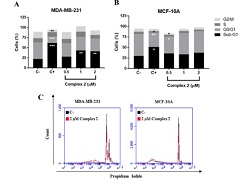The trans-[Ru(PPh3)2(N,N-dimethyl-N'-thiophenylthioureato-k2O,S)(bipy)] PF6 complex has pro-apoptotic effects on triple negative breast cancer cells and presents low toxicity in vivo.
BECCENERIA, Amanda Blanque; POPOLIN, Cecília Patrícia; PLUTÍN, Ana M.; MAISTRO, Edson Luis; CASTELLANO, Eduardo Ernesto; BATISTA, Alzir Azevedo; COMINETTI, Márcia R.
BECCENERIA, Amanda Blanque; POPOLIN, Cecília Patrícia; PLUTÍN, Ana M.; MAISTRO, Edson Luis; CASTELLANO, Eduardo Ernesto; BATISTA, Alzir Azevedo; COMINETTI, Márcia R.
 Abstract: Triple negative breast cancer (TNBC) is a heterogeneous subtype of breast tumors that does not exhibit the expression of estrogen and progesterone receptors, neither the amplification of the human epidermal growth factor receptor 2 (HER-2) gene. Despite all the advances in cancer treatments, the development of new anticancer drugs for TNBC tumors is still a challenge. There is an increasing interest in new agents to be used in cancer treatment. Ruthenium is a metal that has unique characteristics and important in vivo and in vitro results achieved for cancer treatment. Thus, in this work, with the aim to develop anticancer drugs, three new ruthenium complexes containing acylthiourea ligands have been synthesized and characterized: trans-[Ru (PPh3)2(N,N-dibutyl-N'-benzoylthioureato-k2O,S)(2,2'-bipyridine (bipy))]PF6 (1), trans-[Ru(PPh3)2(N,N-dimethyl- N'-thiophenylthioureato-k2O,S)(bipy)]PF6 (2) and trans-[Ru(PPh3)2(N,N-dimethyl-N'-benzoylthioureatok2O, S)(bipy)]PF6 (3). Then, the cytotoxicity of these three new ruthenium complexes was investigated in TNBC MDA-MB-231 and in non-tumor MCF-10A cells. Complex (2) was the most selective complex and was chosen for further studies to verify its effects on cell morphology, adhesion, migration, invasion, induction of apoptosis and DNA damage in vitro, as well as its toxicity and capacity of causing DNA damage in vivo. Complex (2) inhibited proliferation, migration, invasion, adhesion, changed morphology and induced apoptosis, DNA damage and nuclear fragmentation of TNBC cells at lower concentrations compared to non-tumor MCF-10A cells, suggesting an effective action for this complex on tumor cells. Finally, complex (2) did not induce toxicity or caused DNA damage in vivo when low doses were administered to mice. Abstract: Triple negative breast cancer (TNBC) is a heterogeneous subtype of breast tumors that does not exhibit the expression of estrogen and progesterone receptors, neither the amplification of the human epidermal growth factor receptor 2 (HER-2) gene. Despite all the advances in cancer treatments, the development of new anticancer drugs for TNBC tumors is still a challenge. There is an increasing interest in new agents to be used in cancer treatment. Ruthenium is a metal that has unique characteristics and important in vivo and in vitro results achieved for cancer treatment. Thus, in this work, with the aim to develop anticancer drugs, three new ruthenium complexes containing acylthiourea ligands have been synthesized and characterized: trans-[Ru (PPh3)2(N,N-dibutyl-N'-benzoylthioureato-k2O,S)(2,2'-bipyridine (bipy))]PF6 (1), trans-[Ru(PPh3)2(N,N-dimethyl- N'-thiophenylthioureato-k2O,S)(bipy)]PF6 (2) and trans-[Ru(PPh3)2(N,N-dimethyl-N'-benzoylthioureatok2O, S)(bipy)]PF6 (3). Then, the cytotoxicity of these three new ruthenium complexes was investigated in TNBC MDA-MB-231 and in non-tumor MCF-10A cells. Complex (2) was the most selective complex and was chosen for further studies to verify its effects on cell morphology, adhesion, migration, invasion, induction of apoptosis and DNA damage in vitro, as well as its toxicity and capacity of causing DNA damage in vivo. Complex (2) inhibited proliferation, migration, invasion, adhesion, changed morphology and induced apoptosis, DNA damage and nuclear fragmentation of TNBC cells at lower concentrations compared to non-tumor MCF-10A cells, suggesting an effective action for this complex on tumor cells. Finally, complex (2) did not induce toxicity or caused DNA damage in vivo when low doses were administered to mice. | |
| Journal of Inorganic Biochemistry |
| v. 186, p. 70-84 - Ano: 2018 |
| Fator de Impacto: 3,348 |
| http://dx.doi.org/10.1016/j.jinorgbio.2018.05.011 |  @article={002887869,author = {BECCENERIA, Amanda Blanque; POPOLIN, Cecília Patrícia; PLUTÍN, Ana M.; MAISTRO, Edson Luis; CASTELLANO, Eduardo Ernesto; BATISTA, Alzir Azevedo; COMINETTI, Márcia R.},title={The trans-[Ru(PPh3)2(N,N-dimethyl-N'-thiophenylthioureato-k2O,S)(bipy)] PF6 complex has pro-apoptotic effects on triple negative breast cancer cells and presents low toxicity in vivo},journal={Journal of Inorganic Biochemistry},note={v. 186, p. 70-84},year={2018}} @article={002887869,author = {BECCENERIA, Amanda Blanque; POPOLIN, Cecília Patrícia; PLUTÍN, Ana M.; MAISTRO, Edson Luis; CASTELLANO, Eduardo Ernesto; BATISTA, Alzir Azevedo; COMINETTI, Márcia R.},title={The trans-[Ru(PPh3)2(N,N-dimethyl-N'-thiophenylthioureato-k2O,S)(bipy)] PF6 complex has pro-apoptotic effects on triple negative breast cancer cells and presents low toxicity in vivo},journal={Journal of Inorganic Biochemistry},note={v. 186, p. 70-84},year={2018}} |



